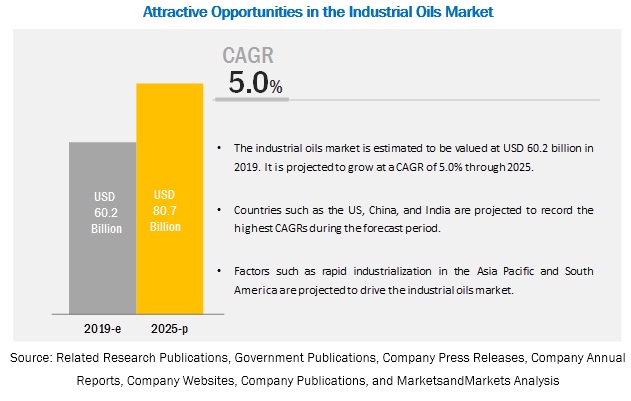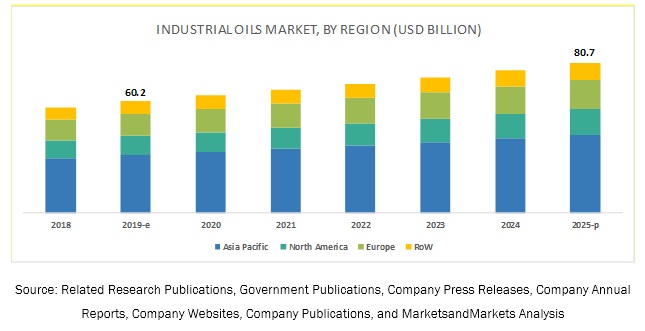
[142 Pages Report] The industrial oils market is estimated to account for a value of USD 60.2 billion in 2019 and is projected to grow at a CAGR of 5.0% from 2019, to reach a value of USD 80.7 billion by 2025. The biodiesel industry is projected to be a major revenue generator for industrial oils manufacturers in the coming years due to its reduced environmental impact. In addition, the industrial sector in the emerging countries of the Asia Pacific region is growing with countries such as China and India, which are the hub of industrial oils, due to the expanding chemical, biodiesel, and cosmetics industries.

The palm segment is projected to dominate the industrial oils market during the forecast period.
The industrial oil market, on the basis of source, is segmented into soybean, corn, sunflower, cottonseed, rapeseed, palm, and others (olive, safflower, copra, groundnut, linseed/flaxseed, and grape seed). The palm segment is estimated to account for the largest share in the global market in 2019. The market in the Asia Pacific region witnesses high growth in Indonesia and Malaysia, which supply over 85% of the global palm oil. This offers growth opportunities to palm oil manufacturers in these countries as they can export as well as utilize for domestic usage in industries such as biofuels.
The grade I (light) segment is projected to dominate the industrial oils market during the forecast period.
The grade I (light) segment is estimated to account for the largest share in the industrial oils market in 2019. The cosmetics & personal care and pharmaceutical industries utilize grade I (light) industrial oil. The cosmetics & personal care industry is witnessing significant growth in countries such as Brazil and China. This is projected to create lucrative opportunities for industrial oil manufacturers in the coming years. In Europe, the cosmetics industry include leading players such as Louis Dreyfus Company (Netherlands), A&A Fratelli Parodi Spa (Italy), Soya Mills SA (Greece), and Henry Lamotte Oils GmbH (Germany), offering industrial oils that find applications in the cosmetics & personal care industry. These include cosmetics & personal care products include shampoos, soaps, and sunscreens. The region is also projected to be a major revenue generator for industrial oil manufacturers in the coming years.

Increasing demand from the biodiesel sector is projected to drive the industrial oils market in the Asia Pacific
Biodiesel is used as an alternative fuel for diesel engines. It attracts the attention of the users due to its renewability, purity, and low exhaust pollution. Biodiesel is produced from a variety of oilseeds. In the European region, rapeseed oil is mainly used for the production of biodiesel, whereas in the US, soybeans are dominant biodiesel feedstock.
Biodiesel has significantly lower emission levels than petroleum-based diesel when it is burned, whether used in its pure form or blended with petroleum diesel. It does not contribute to a net rise in the level of carbon dioxide in the atmosphere and also minimizes the intensity of greenhouse effects. In developing countries, the demand for biodiesel is increasing due to the higher availability of land, favorable climatic conditions for agriculture, and lower labor costs. In addition, in these countries, there is a growing trend of adopting modern technologies and efficient bioenergy conversion using a range of biofuels, which are provided at affordable prices than fossil fuels.
Key Market Players
Key players in global industrial oils market include Cargill (US), Bunge Limited (Netherlands), Wilmar International (Singapore), Louis Dreyfus Company B.V. (Netherlands), Archer Daniels Midland (ADM) (US), Buhler Group (Switzerland), CHS Inc. (US), Ag Processing Inc (US), A&A Fratelli Parodi Spa (Italy), Gemtek Products (US), AAK Kamani (India), and Soya Mills SA (Greece). These companies have undertaken expansions as one of the key strategies to expand their presence in this market.
Scope of the Industrial Oils Market Report
|
Report Metric |
Details |
| Market size available for years | 2017-2025 |
| Base year considered | 2018 |
| Forecast period | 2019-2025 |
| Forecast units | Value (USD and Tons) |
| Segments covered | Source, Type, End Use, and Region |
| Geographies covered | North America, Europe, Asia Pacific, and Rest of the World (RoW) |
| Companies covered | Cargill (US), Bunge Limited (Netherlands), Wilmar International (Singapore), Louis Dreyfus Company B.V. (Netherlands), Archer Daniels Midland (ADM) (US), Buhler Group (Switzerland), CHS Inc. (US), Ag Processing Inc (US), A&A Fratelli Parodi Spa (Italy), Gemtek Products (US), AAK Kamani (India), and Soya Mills SA (Greece). |
This research report categorizes the industrial oils market based on source, product, type, and region.
On the basis of source, the market has been segmented as follows:
- Soybean
- Corn
- Sunflower
- Cottonseed
- Rapeseed
- Palm
- Others (Olive, Safflower, Copra, Groundnut, Linseed/Flaxseed, and Grape Seed)
On the basis of type, the market has been segmented as follows
- Grade I (Light)
- Grade II (Medium)
- Grade III (Heavy)
On the basis of end-use, the market has been segmented as follows
- Biofuel
- Paints & coatings
- Cosmetics & personal care
- Pharmaceuticals
- Others (Polymers, thermal, rubbers, agriculture, fillers, adhesives, and chemicals)
On the basis of region, the market has been segmented as follows:
- North America
- Europe
- Asia Pacific
- Rest of World (RoW)
Key questions addressed by the report
- What are the new product areas for industrial oils that the companies are exploring?
- Which are the key players in the industrial oils market and how intense is the competition?
- What kind of competitors and stakeholders would industrial oils companies be interested in? What will be their go-to-market strategy for this market, and which emerging market will be of significant interest?
- How are the current R&D activities and M&A’s in the industrial oils market projected to create a disrupting environment in the coming years?
- What will be the level of impact on the revenues of stakeholders due to the benefits of industrial oils compared to different stakeholders, in terms of, rising revenue, environmental regulatory compliance, and sustainable profits for the suppliers?
- By:admin
- 0 comment

Your comment is awaiting moderation.
Philippe Étienne, the ambassador of France to the United States.